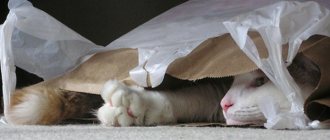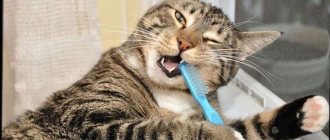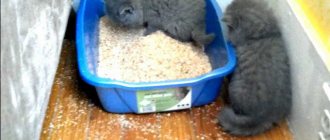Symptoms and signs of cat poisoning by mouse
Poisonous substances used to bait mice and rats are called rodenticides. There are several types of poison for rodents:
- Anticoagulants (rat poison) are toxic substances that prevent blood clotting. Once in the mouse’s body, the poison provokes internal bleeding and death of the tailed pest.
- Zinc and aluminum phosphide - when mixed with gastric juice, it releases phosphine gas, which is destructive to the liver.
- Cholecalciferol is a loading dose of vitamin D₃. Having penetrated the animal's body, the poison leads to liver failure and death.
- Bromethalin is a poison for mice containing potassium cyanide. Lead to damage to the central nervous system and cerebral edema.
Most baits for rats and mice add various flavors (cheese, meat) to attract pests to the poison. Pets are also not averse to enjoying the fragrant find, as a result of which they experience severe intoxication and dysfunction of vital organs. In order to provide first aid to a cat and save the animal from death, it is necessary to find out what substance the pet was poisoned with.
Almost all anticoagulants are green, and upon noticing such scattered poison on the street, the cat owner will be able to accurately tell the veterinarian the reason for the pet’s poisoning.
Signs of intoxication in a cat that has eaten one poisoned rodent will not appear immediately. Typically, it takes 3 to 5 days for the poison to cause problems in the cat’s body. During this time, the animal owner will have a chance to recognize poisoning and help his four-legged friend. But if a cat has hunted several of these rats and mice or swallowed a sufficient amount of a toxic chemical to cause poisoning, intoxication can occur within a few hours.
When a cat has eaten a poisoned mouse, the symptoms of rat poison intoxication boil down to problems with blood clotting, which is why the animal experiences:
- Refusal to eat, complete indifference to what is happening around.
- Lethargic state.
- The desire to hide in a dark and distant corner. Animal refusal to eat if poisoned
- Heavy breathing, cough.
- Diarrhea and vomiting.
- Presence of hematomas on the body.
- Leakage of blood from the anus, nasal passages.
- Edema.
- Bleeding gums.
- Swelling and inflammation of the joints.
- Appearance of blood in the urine.
- Uremia.
- Increased abdominal volume.
The most reliable sign of poisoning by rat poison is redness of the eyeballs. The eyes become red due to ruptured blood vessels, and the animal completely loses the ability to see. Signs of intoxication may appear suddenly or appear gradually, depending on the amount of poison that has entered the cat’s body. If your cat has been poisoned by rat poison, read here.
Precautionary measures
It just so happens that cats are predators, and eating rodents is a natural behavior for them. Accordingly, they will always be at risk; it is very difficult to prevent cases of poisoning. Perhaps the most protected are cats living in city apartments, but even in this case it is possible that poisoned rodents may enter the house (during mass deratization).
So here everything depends on the vigilance and attentiveness of the animal’s owners. If you hear that your area will be treated for rats and mice (and by law, the sanitary and epidemiological station is required to warn about this), do not let your cat go outside. If you notice something strange in your pet's behavior, immediately take him to the veterinarian: it is possible that he has already eaten a poisoned rodent. Always have a supply of activated carbon at home, with which you can provide first aid to your cat in case of poisoning.
Important! Be sure to try to find packaging or samples of the poison. This will help in prescribing adequate therapy.
First aid for a cat that has eaten a poisoned mouse
If a cat ate a poisoned mouse and developed intoxication, the first thing the animal owner should do is not to panic. You need to gather your thoughts and start acting, because in some cases there are only a few hours to save the life of a pet. All the owner can do to help the animal is to try to quickly remove the poison from the body. But if you are not sure that the poisoning occurred with rat poison, under no circumstances should you induce vomiting or use substances that irritate the esophagus or stomach. Vomiting will certainly provoke internal bleeding, from which the pet will die.
What to do if a cat ate a poisoned mouse? When intoxicated with rat poison, a large amount of adsorbent (activated carbon, Polysorb or Enterosgel) is injected into the pet, then Vikasol (vitamin K) is injected intramuscularly. The dose of the vitamin is deliberately increased; it is not able to harm the cat, but it will definitely help cope with internal bleeding. After the manipulations have been performed, the animal is taken to the veterinarian for further symptomatic treatment.
In case of Cholecalciferol poisoning, the cat must be induced to vomit (give a solution of soda or salt) and urgently take the animal to the veterinary clinic.
Useful information: how to rinse a cat's stomach or give an enema.
Kidney failure is very dangerous, and if measures are not taken in time, the cat will die or, at best, remain permanently disabled. The veterinarian will prescribe heavy doses of diuretics to the affected animal to help quickly remove the poison from the body. A blood or plasma transfusion may also be required.
Aluminum and zinc phosphide is considered the most dangerous poison. Phosphine gas released by an animal's stomach can cause poisoning not only of the cat, but also of its owner. The cat ate a poisoned mouse, what should the owner do in this case? Only repeated gastric lavage can save your furry friend, but this should only be done in the fresh air.
It is extremely important to tell the doctor about all the symptoms of poisoning noticed in the cat, not forgetting to indicate whether poison for mice or rats was noticed in the area.
Diagnostics and veterinary care
Based on the results of the examination, treatment is prescribed.
The process of identification and diagnosis is carried out by taking tests and examining the external condition of the animal; you will also need to do an ultrasound to determine whether there is damage to the internal organs.
Based on the results of the identification and examination, treatment and preventive measures are prescribed to strengthen the body. In the event that a cat has been poisoned by a poison that the owner used to get rid of rodents on his own, then during the visit it is necessary to provide the veterinarian with a container of poison - this will help to minimize the time for diagnosis and prescribing a course of treatment.
It is important to remember that even a quick reaction from the owner and initiation of therapy does not guarantee the cat’s survival. However, quick, immediate action increases the chances of a positive outcome. And also, except for adsorbents, no medications intended for humans should be given to a cat.
Inducing vomiting
Emetic root syrup will help induce vomiting in a cat.
One effective treatment is inducing vomiting . Emetic root syrup in an amount of 3–4 ml will help with this. Also, as an option, if there is no vomiting root, you can give the cat regular warm boiled water to drink, then make the movement characteristic of inducing vomiting - forcefully but gently press on the root of the cat’s tongue.
Treatment
It is necessary to give the cat plenty of clean water.
Further treatment involves the use of adsorbents at the rate of 1 tablet = 1 kg of weight. The course of treatment is 7 days.
But you also need to give your cat plenty of clean, regular (not boiled) water. A necessary drug that prevents further bleeding and possible complications is vitamin K1. The course of treatment is 1–3 weeks. It is important to remember that the vitamin should be given only 2 hours after taking the adsorbent. The exact dosage is determined by the veterinarian during administration.
Rehabilitation and nutrition of a cat after mouse poisoning
Poisoning in cats can lead to serious consequences for the health of the animal, so a recovering pet needs special care and diet. It is important to prepare a warm and quiet place for the cat to lie down, to create complete peace for the pet. Feeding the cat on the first day after assistance is completely excluded. All that can be offered to the animal is simple, clean water. The next day, the four-legged friend begins to introduce light and low-calorie food into the diet:
- veal;
- liver;
- lean fish;
- vegetables boiled in water;
- rice porridge.
It is better to give food in liquid or puree form, otherwise the cat’s stomach simply will not be able to digest the food. You need to introduce foods in small portions, gradually increasing the amount of food. It happens that a cat ate a poisoned mouse and for several days after intoxication the pet may have no interest in food. You cannot force feed your furry pet, but if the animal is too weak, you can use nutrient solutions for intravenous administration.
2 weeks after the start of treatment, your four-legged friend must be shown to a specialist and undergo blood tests. If the platelet count is normal, therapy can be stopped, otherwise treatment is continued until the blood counts return to normal.
How to protect your pet from rat poisoning?
Very simple. We must do EVERYTHING to ensure that the poisonous bait is inaccessible to him.
Cats have been known mousecatchers since their domestication. Some individuals are so good at catching rodents that they are able to completely rid both the house and the surrounding area of them. It is not surprising that rat poisoning in cats is one of the main dangers that can await your pet. You need to clearly know the main types and principles of action of the poison, since in this case the chances of saving the cat’s life increase sharply.
Consequences for a cat who eats a poisoned mouse
Substances intended for baiting mice take a long time to be eliminated from the body of cats and almost always have consequences for the health of their four-legged friend. If a cat has eaten a poisoned mouse, then after intoxication the following may be observed:
- chronic cystitis, weak bladder;
- infertility, the appearance of stillborn kittens in the litter;
- chronic jaundice due to liver damage;
- hearing loss, vision loss;
- paralysis and cramps of the limbs;
- severe allergies;
- coma.
Poisoning with rat poison
Is it very scary? Is it different from ordinary poisoning? Yes! and YES!
A cat can be poisoned by rat poison in two ways:
- By eating the poison itself (direct). Rodent baits have a pleasant taste, which makes them attractive not only to direct consumers, but also to dogs and cats.
- Eating a poisoned rodent (indirect). A poisoned rat or mouse, weakening, becomes easy prey for a cat. Modern means are very effective, so the portion of poison that enters the rodent’s body will be sufficient for a larger animal.
Rat killing products use rodenticides containing different active ingredients - coumarin, indandione, etc., therefore their effects on the body are different. But most often cats suffer from anticoagulant rodenticides. We will consider them.
Anticoagulants are chemical substances that prevent blood from stopping. Anticoagulant poisons contain coumarin: zoocoumarin, warfarin, flomucafen, coumatetralyl, bromodiolon, brodifacoum.
Prevention of poisoning of cats by mice
It is difficult to avoid intoxication, because most animals are accustomed to walking outside on their own. To prevent the cat from having the desire to dine on a caught mouse, the animal should be released outside only when well fed. Rat poison and other rodent poisons should be scattered in places where it will be difficult for a cat to reach the bait.
If you are poisoned by a mouse, the owner must be prepared. If intoxication develops, you should try to provide first aid to your pet and take your furry friend to the veterinarian as soon as possible.
Treatment in hospital
Upon admission to the hospital, the initial diagnosis is made based on your story, and then based on the test results. This is why it is so important to monitor your cat and, if possible, record all signs of poisoning.
After blood and urine tests, the doctor makes a diagnosis and prescribes treatment:
- administration of an antidote;
- intravenous injections of drugs;
- maintenance therapy;
Vitamin K1 is usually used as an antidote against rat poison, which affects blood clotting and strengthens the walls of blood vessels. If this is not in your first aid kit or even in the veterinary clinic, then take its replacement - vitamin K3 - Vixol, Menadione.
Your cat's recovery depends on the nature of the poison and its amount, how much time passed before treatment was provided, the age of the animal and its concomitant diseases. The younger the cat and the earlier help was provided, the greater the likelihood of the cat’s recovery.
Mice in the diet - harm or benefit
Rodents are as beneficial as they are harmful to cats, at least according to veterinarians who are concerned about the “bouquet” of diseases transmitted by the former. It is believed that mice (like rats) are carriers of infectious diseases that are dangerous both for the pets themselves and for their owners.
The list of such diseases includes:
- trichinosis - difficult to treat and caused by helminths that parasitize the intestines (larvae penetrate muscle tissue and destroy it);
- ringworm ( ringworm ) is a fungal infection that affects the appearance of the coat/skin. The therapy is simple but long-lasting;
- leptospirosis - affects various organs and is accompanied by fever. A cat becomes infected through contaminated water, eating mice or coming into contact with their secretions;
- toxoplasmosis is dangerous for pregnant women and is often asymptomatic. About 50% of rodents are considered carriers of the disease;
- salmonellosis is an acute intestinal infection that threatens humans and animals;
- tularemia , pseudotuberculosis and others.
Hypothetically, a cat that eats mice could become infected with rabies, but this probability is reduced to zero if the animal is vaccinated. The second thing that should reassure the owner is that the virus is transmitted through saliva, that is, the mouse must injure the cat.
Important! Those who live in private homes and keep rat-catching cats say that their animals hunt rat mice for many years, avoiding any infectious diseases. Several generations of cats live to a ripe old age, enriching their daily diet with rodents without tragic consequences for health.
A cat is more likely to be poisoned if it tastes a mouse that has died from the poison used in deratization. If the poisoning is mild, you can get by with pharmaceutical absorbents; in case of severe poisoning (vomiting, diarrhea with blood, liver/kidney failure), call a doctor immediately. Also, when in close contact with rodents, pampered domestic cats often pick up fleas or helminths.
Return to content
Urgently - to the veterinarian!
And yet, in the case of poisoning, the need to contact a competent specialist is obvious. In addition, symptoms of poisoning by rat poison often do not appear immediately, but only several days after the deadly poison has been eaten - a period quite sufficient for toxic substances to firmly establish themselves in the body of the unfortunate cat. Therefore, in order to save a cat (or a kitten, which, due to its restlessness, also has every chance of being poisoned by rat poison), you need to know exactly what kind of poison it was poisoned with when it was eaten by a poisonous mouse or poisoned bait. It’s one thing if you poisoned the rats yourself - in this case, you must show the veterinarian the packaging of the toxic product you used. Otherwise, in order to prescribe competent and effective treatment, you will have to do a special analysis to determine the toxic substance.
If you, if possible, control your pet’s movements, monitor changes in its condition and behavior, and respond to them in a timely manner, then the tragic consequences of poisoning with potent rat poisons may well be avoided. And do not try to rely on your own strength in the fight against the disease, do not count on the fact that a strong cat’s body will be able to cope with the scourge on its own - immediately contact a veterinarian.
Theoretically, it can be assumed that veterinary care is not available to everyone and not everywhere, but even in our vast country, such “bear corners” are becoming fewer and fewer every year. Only competent assistance from a specialist, a well-developed treatment strategy and subsequent rehabilitation will help preserve the life and health of your furry pet, who will delight you and your loved ones for a long time.
Instincts or fun
Yard kittens, forced to fight for existence, hunt mice like adults from the age of 5 months. In the USA, they conducted an experiment in which they established a connection between the living conditions of kittens and their hunting reflexes, first by mating purebred and street cats with one cat. The litters, after they were born, were swapped - the purebreds were given to the yard mothers and vice versa.
As a result, it turned out that initial hunting skills were inherent in both groups, since mothers regularly carried mice to their litters. The difference appeared at the next stage: the street cat killed rodents and gave them to kittens, while the purebred cat only played with the mouse.
Important! The researchers concluded that to consolidate the reflex of catching/eating living creatures, instinct alone is not enough, but skills acquired through education are necessary.
On the other hand, a kitten growing up isolated from its fellow cats independently learns the basic wisdom of a cat (washes itself, sharpens its claws, snorts, relieves itself, meows pitifully or angrily) and is quite capable of catching a mouse. Another question is whether he will eat it or not. If a kitten is very hungry, it is unlikely that the lack of a mother's example will stop him.
Return to content











